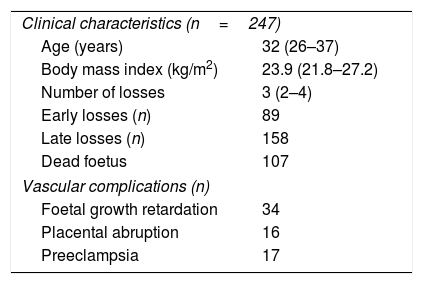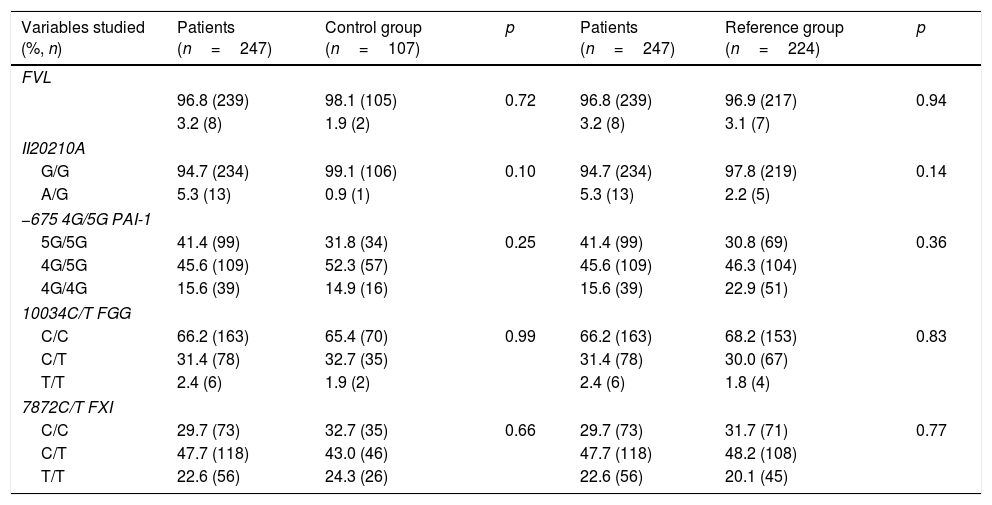Thrombophilia might increase the risk of suffering from obstetric complications by adversely affecting the normal placental vascular function. Our aim was to study the distributions of five thrombosis-associated genetic variants: factor V Leiden, prothrombin G20210A, −675 4G/5G PAI-1, 10034C/T gamma fibrinogen and 7872C/T factor XI and the frequencies of the deficiencies of protein C, S and antithrombin in Argentinian patients with recurrent pregnancy loss (RPL) and, therefore, to analyse their association with the risk and timing of RPL and the risk of suffering other vascular obstetric pathologies.
Patients and methodsWe performed a case–control study that included 247 patients with idiopathic RPL (cases), 107 fertile controls and 224 subjects from general population (reference group). Cases were stratified according to the gestational time of the losses (early RPL, n=89; late losses, n=158; foetal losses, n=107) and according to the type of vascular obstetric pathologies.
ResultsNo differences were found in the distribution of the genetic variants among RPL group vs. control/reference group (p>.05). Similarly, no differences were observed in their distributions when analysing RPL patients stratified according to gestational times or vascular obstetric pathologies (p>.05), except for the factor V Leiden carriage in patients with foetal growth retardation vs. controls (11.8%, 4/34 vs. 1.9%, 2/107; p=.04) (OR=7.11 [1.24–40.93], p=.03).
ConclusionsFactor V Leiden might have a significant impact on certain obstetric pathologies such as foetal growth retardation. The genetic variants, 10034C/T gamma fibrinogen and 7872C/T factor XI, associated with thromboembolic disease, would not have an impact on PRE.
La trombofilia aumentaría el riesgo de complicaciones obstétricas al afectar la función vascular normal a nivel placentario. Nuestro objetivo fue estudiar las distribuciones genotípicas de cinco variantes genéticas asociadas a trombosis: factor V Leiden, protrombina G20210A, −675 4G/5G PAI-1, 10034C/T fibrinógeno gamma y 7872C/T factor XI y las frecuencias de los déficits de proteína C/S/antitrombina en pacientes argentinas con pérdida recurrente de embarazo (PRE) y, así, analizar su asociación con PRE, el tiempo gestacional de las pérdidas y el riesgo a sufrir otras complicaciones obstétricas de origen vascular.
Pacientes y métodosSe realizó un estudio de casos y controles, incluyendo 247 pacientes con PRE (casos), 107 mujeres fértiles (controles) y 224 individuos de población general (grupo de referencia). Los casos fueron estratificados de acuerdo con el tiempo gestacional de las pérdidas (PRE temprana, n=89; pérdidas tardías, n=158; pérdidas fetales, n=107) y según el tipo de complicación obstétrica.
ResultadosNo se encontraron diferencias significativas (p>0,05) en la distribuciones genotípicas de las variantes analizadas entre el grupo PRE comparados con controles/grupo referencia, respectivamente. Tampoco según tiempo gestacional de la pérdida o las complicaciones obstétricas, excepto para la portación factor V Leiden en pacientes con retraso del crecimiento fetal vs. controles (el 11,8%, 4/34 vs. el 1,9%, 2/107 p=0,04) (OR=7,11 [1,24-40,93], p=0,03).
ConclusionesEl factor V Leiden cumpliría un rol importante en ciertas patologías obstétricas como retraso del crecimiento fetal, donde la impronta trombótica parecería tener un papel importante. Las variantes genéticas 10034C/T fibrinógeno gamma y 7872C/T factor XI, con impacto reconocido en enfermedad tromboembólica, no estarían asociadas a PRE.
Artículo
Comprando el artículo el PDF del mismo podrá ser descargado
Precio 19,34 €
Comprar ahora








